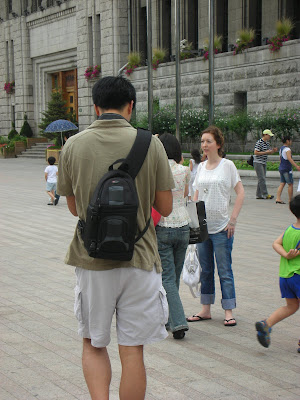Sunday, August 26, 2007
asia's gambling resort destination, macau, a former portuguese colony, is booming with construction and development. hotelier, casino mogul, and avid art collector , steve wynn has a franchise there, just down the road from a sands/venetian. the new york times discusses macau's vice boom in an article entitled: bigger than las vegas, that's macao's bet. clever.
but before all of these modern casinos were built, there was hotel lisboa, an eclectic and gaudy signature development on macau's strip.
of course, the newer casino hotels have the benefit of incorporating the newest technological innovations and can offer the most luxurious amenities. and yet, still, hotel lisboa stands alone as an original, at least in one respect: the bathrooms.
the beautiful nude on the wall is not the only design element to employ a faux bas relief aesthetic. at the urinal, while you stand on stainless steel nodes, you remain poised above the purge as the floor flushes around you. we are unsure if this has any actual public/personal health benefits of it it's all just for show.
Thursday, August 23, 2007
posing as a tourist couple, one of our reporting teams was preparing an expose on the child labor practices of korean cultural event performance troupes. one particularly egregious violator was performing in seoul's city hall park - using the auspices of glorious korean tradition to exploit child labor. our crack team was busily snapping photos and mingling with some of the teen and pre-teen performers during a brief respite from the rigors of their abusive schedule. for example, the traditional korean mask pictured here is as grotesque as it is constricting. not only are these facades disturbingly ugly, but they also obstruct airflow.
these drums are piercingly loud. notice our reporter's cringe. with decibel levels like this, these poor children should all be wearing ear-plugs or some alternative form of cochlear protection.
having secured interviews and photographic evidence, the reporters were days away from taking the story to press, that is, until a competing news organization, the daily kimchi, ran photos of our reporters hard at work, exposing them and destroying the critically important guise of anonymity.
Seoul City Hall: Always Something To See
A group of people were doing some sort of cultural dance with costumes and the whole nine yards. After they finished, they left their equipment neatly laid out to take a break. Then, right after some people came by to take pictures—but they started putting on the masks! I don’t know if that was normal or not, but I should’ve joined in on the fun! Check out this couple:
I should've put this mask on
this is not seoulitary confinement's first encounter with the daily kimchi, but it is the most serendipitous. in an earlier confrontation, gdog at the daily responded to some unduly harsh criticism. read it here. and gdog's response.
by sheer numbers, the daily kimchi is (was?) one of seoul's most popular expatriate blogs, and merits high marks for its highly informative, exceptionally consistent posts and stellar photography. our reporters knew they were watching a master in the midst of his craft and sensing the propitious moment, snapped a picture. we should have said, "HOLLA." gdog and devante, your contributions will be missed. godspeed.
Wednesday, August 22, 2007
though the article makes no specific mention of korea, it does address the philippines. a december assignment to manila sent seoulitary confinement's reporters right into the fray, to a town where fair skin begets celebrity and every bar of soap holds the promise of washing the dark away.


in korea, the war against melanin manifests in different ways, but is no less intense. whitening creams, 화이트닝 크림 (hwa-ee-tuh-ning kuh-reem), populate store shelves and pervade the beauty supply marketplace. a quick search through korea's web portal naver.com yields a plethora of ads for various creams, powders, and salves.
the results also include a link to a korea herald article: Beauty industry targets Asian women`s obsession with white skin
Cosmetics companies will have us believe that there is hope in a jar.
After spending millions on independent and commissioned research, major cosmetics brands woo customers each season with their latest and best-to-date products.
This season it is the Asian women`s fixation with flawless, "white" skin that the beauty industry is focusing on. International as well as domestic brands have developed "whitening" or "brightening" products that claim to make the complexion as pure as snow.
at the dongdaemun (east gate) market, the artificial whitening trend has reached the height of absurdity.

Friday, July 20, 2007
Ridin on a horse, drinkin whisky out a bizoot
With the wings and the teeth of an african bat
Her middle name is Mudbone and on top of all that
Ya mama's got an afro, with a chin strap"
- The Pharcyde
The poetic words above, a modified clerihew of sorts, have long inspired, yet perplexed us. Other fans of the Pharcyde may similarly wonder, "How exactly might one affix an afro with a chinstrap?" Archimedes exclaimed, "Eureka!" Seoulitary Confinement exclaims, "Holla!" Behold The Black Crunch Bar:

And its spokespeople: Black Boy and Black girl.

The slogan is pretty catchy:

I guess once you go Black Crunch, you never go back.
Despite what you may wish to believe, this confection's "Oreo Cookie" flavor is NOT a subtle nod to racial harmony.

In Korean, this ice cream bar is named 까마쿤 (~ka-ma-kun). While unable to decipher a direct translation, Seoulitary Confinement entreated a trusty source to speculate as to the meaning. Two of many possible explanations surfaced and are worth noting:
1) A play on the similar sounding phrase "까맣군", which approximately means, "Oh, it's too dark."
2) 까마귀 (~ka-ma-qui) is the Korean word for raven/crow.
While we here at SC want to make clear these translations are by no means authoritative, this sort of product branding underscores Korea's struggle with cultural globalization. In many instances, Korean society lacks the reflexive introspection that multicultural societies are forced to adopt. Nobody in the Lotte Group's marketing department stopped to ask, "Is this caricature appropriate for a multi-ethnic populace?" Then again, Korea is NOT multi-ethnic. In fact, Korea has in the last century emerged from 1000 years of cultural, linguistic, and economic seclusion. Of course, there are going to be some growing pains. Robert Koehler wrote:
According to a survey by the Ministry of Government Administration and Home Affairs, some 536,627 foreigners were residing legally and illegally for a period of 90 days or more in the Republic of Korea as of April. This accounted for 1.1 percent of the population, the first time ever the recorded number of foreign residents has surpassed 1 percent...Immigration authorities believe the real number of foreigners, including illegal aliens, to be closer to 1 million.
Conveniently hosted by a Korean government website, in his article Mr. Koehler uses these statistics to argue that "demographic changes spell the end of Korea's ethnic homogeneity." Not quite. Regardless of how the local authorities wish white-wash the situation (pun intended), a 98% ethnically homogeneous populace is hardly a bastion of diversity. Awkward (sometimes inappropriate) regard to foreign residents is inevitable.
For a much more deft and nuanced analysis of these issues, PLEASE read Dr. Gi-Wook Shin's August 2006 Korea Herald Article on Korea's "ethnic nationalism." In Korea, blood ancestry continues to define national identity.
Recently, NPR carried an excellent report (Ethnic Bias Seen in South Korea Teacher Hiring), highlighting another manifestation of Korea's ethnic bias. Seoulitary Confinement commends the excellent reporting by Jason Strother. As a citizen journalist, in the truest sense, Mr. Strother sources facts and elicits relevant opinions in interviews. Then, he assembles the information and presents it with objectivity and balance. This stands in stark contrast to South Korea's renown and highly regaled journalistic innovation, OhMyNews.com, which is, basically, a bunch of people making shit up.
This piece also includes an interview with Mr. Michael Hurt, Seoul's resident Metropolician and an expert in Korea's multicultural affairs. His point about skin-color prejudices inherent in agrarian societies is well taken and worthy of further examination...
Wednesday, April 25, 2007
seoulitary confinement is not in the business of endorsements. in fact, as we have, in the past, lobbied against voting, what follows may seem the least bit hypocritical. nonetheless, here we depart from our predeliction toward preternatual opposition in order to support a worthy cause, one imperative to maintaining free-thinking societies the world over. it's always a worthy cause, isn't it?
the halfway houseband is nominated for an i-go cars compilation album and you get to vote. time is running out! please, you have until april 30th to cast as many votes as possible. remember, it's chicago, so, vote early and vote often.
click here to cast your vote.
and if for some reason you do not or cannot implicitly trust seoulitary confinement; if you question our hard won credibility; if you doubt our keen aestheticism; if you hail from the 'show me state' or are otherwise a cynic, a skeptic or a contrarian; we salute you! you have passed the first test. if you need to read a critic's review, look here. of course, forming your own opinion is an exercise in civil liberty, so feel free to listen to the halfway houseband's abridged library of collected works, you philistines:
Abilene
Can't You Hear Me Callin'
Dandelion
Four Walls In A Day
Here's One From Me To You
I'll Teach You A Lesson
It Won't Be Long
Mercy
Miss Molly
The Thief (Live)
The Goose
Wednesday, April 18, 2007
you can tell a lot about a man's character by how he carries himself through both success and failure. athletes, politicians, celebrities generally, are the easiest to judge in these moments. usually, their glorious, heroic successes and humiliating, abject failures are broadcast or simulcast or sometimes forecast, submitted as public record to reside in the public domain and to be scrutinized, forever, in slow-motion, stop action replay. but in the arena, raw passion and uninhibited emotions are held in check by thin facades. despite the camera's ubiquitous presence, or perhaps because of it, people under pressure will react; their true selves exposed to the world. a personal favorite example may come to mind. eric cantona's no-holds-barred drop kick into the stands. chris webber's infamous timeout. mike tyson versus evander holyfield. pete sampras' 14 grand slam titles. "comeback kid" joe montana's cool head. chris everett attacking jim rome. tiger woods or lance armstrong in any number of their victories. the 1960 kennedy-nixon debates. terrell owens verus george teague. terrell owens versus hydrocodone. don imus versus rutgers women's basketball. mike tyson versus robin givens. the nba. the examples are innumerable, so please, post a comment with your own favorite moment. we here at seoulitary confinement want to bring one specific example to your attention.
 few may be such avid fans of ncaa men's big 12 basketball to have institutionalized this memory, but it stands the test of time and illustrates the point as well as any. in the 2003 big 12 tournament, the colorado buffaloes were favored over the kansas state wildcats. with three seconds left in the game and holding a tenuous 2 point lead, the kansas state wildcats were poised for an upset victory. colorado needed to inbound the ball from the backcourt before taking one final shot. an arching inbound pass is intercepted by kansas state's pervis pasco, a 6' 9", senior forward from clearwater, florida. with assured victory in his hands, pasco, overjoyed by his personal success, high on the adrenaline rush, began to celebrate. left arm raised, anticipating the duly earned accolades, pervis pasco ran toward the nearest baseline. unfortunately, he never put the ball down on the court, never commenced his dribble and was subsequently called for the violation - traveling. seizing defeat from the jaws victory, "the big perv" gave possession to colorado with 1.8 seconds remaining. confusion ensued and while the referees conferred regarding the game clock, colorado (out of timeouts) drew up another last second inbound play. this time, it worked. in a rather unorthodox, wing-and-a-prayer shot, cu's james wright banked a three-point shot off the backboard, for the win. you can read a better description here. please watch the sequence, in all its agonizing, heart-wrenching glory.
few may be such avid fans of ncaa men's big 12 basketball to have institutionalized this memory, but it stands the test of time and illustrates the point as well as any. in the 2003 big 12 tournament, the colorado buffaloes were favored over the kansas state wildcats. with three seconds left in the game and holding a tenuous 2 point lead, the kansas state wildcats were poised for an upset victory. colorado needed to inbound the ball from the backcourt before taking one final shot. an arching inbound pass is intercepted by kansas state's pervis pasco, a 6' 9", senior forward from clearwater, florida. with assured victory in his hands, pasco, overjoyed by his personal success, high on the adrenaline rush, began to celebrate. left arm raised, anticipating the duly earned accolades, pervis pasco ran toward the nearest baseline. unfortunately, he never put the ball down on the court, never commenced his dribble and was subsequently called for the violation - traveling. seizing defeat from the jaws victory, "the big perv" gave possession to colorado with 1.8 seconds remaining. confusion ensued and while the referees conferred regarding the game clock, colorado (out of timeouts) drew up another last second inbound play. this time, it worked. in a rather unorthodox, wing-and-a-prayer shot, cu's james wright banked a three-point shot off the backboard, for the win. you can read a better description here. please watch the sequence, in all its agonizing, heart-wrenching glory.james wright probably deserves as much credit as pasco deserves blame. in a moment where composure and maturity would have brought success, pervis pasco succumbed to more base urges. but after all, he was a young college student, not a professional. he made a mistake. it happens. the measure of a man comes often from how he handles defeat. and since we saw how the big perv handled victory, we are only left to hope that he would learn and improve.
lebron james was the first pick in the 2003 NBA draft. like so many other talented college athletes, our friend pervis pasco went undrafted and unsigned. but unlike those less dedicated men, the tale of pervis pasco does not end there. unable to find a home in the nba, pervis, not unlike many aspiring professionals, sought employment in a less prestigious and less lucrative, but no less competitive overseas market. and this is where seoulitary confinement and pervis pasco once again cross paths.
founded in 1997, the korean basketball league (kbl) is burgeoning. by rule, each league team must carry two foreign players on the roster. with only ten teams, an elite group of (mostly american) talent is imported to add depth and marketing opportunities. korea's unique corporate culture makes each franchise into really nothing more than an advertising gimmick. the kbl's generous USD 25, 000.00 per month salary must be very attractive to the marginally employable professional basketball aspirant. however, the league's rigorous qualifications and requirements are designed to filter out any talented-but-gold-digging athlete of questionable character. not only must the player be under 6' 10" tall, but also is "required" to submit 3 character references (optional)**. clearly, pervis pasco barely made the cut. this weekend, the KBL fined, expelled and banned pervis pasco for on court violence. taking umbrage with a hard foul, "the big perv" retaliated by choking his opponent. responding appropriately, the referee ejected pervis from the game. as the sequence of photos indicate, mr. pasco disagreed with the referee's decision and let his disagreement be known by a quick forearm to the referee's face.
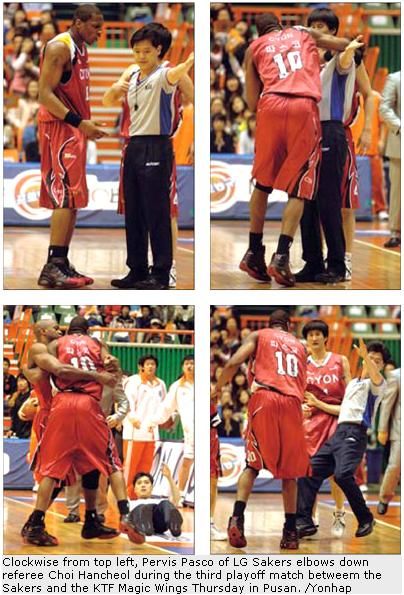
we only hope that pervis pasco is able to find a way to continue his passion and indubitably provide humanity with further examples of how not to behave.
** see the following link for information about kbl recruiting. do you have what it takes? pay special attention to the "optional" requirements. http://www.kbl.or.kr/eng/eng01_01.asp
A. Qualifications
1. Must have at least a high school diploma
2. Must be at least 18 years of age
3. Height limit : Under 6′10″(208cm) (Measured without wearing shoes)
B. Required Documents
1. KBL Tryout Application Form (must be signed by player)
2. Resume (with a recent photo)
3. Personal data (stats must be official game stats)
4. A copy of university / college / high school diploma (or copy of transcript)
5. Letter of Clearance from previous team (as required by FIBA)
6. Letter of Recommendation (if available)
7. Character Reference from 3 non-family members (optional)
C. Compensation & Condition
1. The term of player's contract is from September 1st, 2007 to March 31st, 2008(7 months contract). Each player will receive the net amount of US$25,000 per month during the regular season. Players will additionally get paid a net bonus of US$300 for every winning game as a winning bonus.
2. In the playoffs, players will be compensated for his extended services on a pro rata basis with the monthly payment of the net amount of US$25,000. The players will additionally get paid a playoffs incentive bonus.
3. The clubs shall provide a dormitory room, meals during the season, and a round trip of airline tickets(business class) for each player.
4. A player once can invite one of his relatives during the season. The clubs shall provide a round trip of airline ticket & his(or her) board and lodge for the maximum of 7 days.
Thursday, February 08, 2007

In early December 2006, police apprehended a ranking political party official on suspicions of attempted rape. A witness claims Mr. Jeong Seong-Rae, chairman of a regional Grand National Party (GNP) steering committee, stopped on a street in Seoul’s upscale Apgujeong neighborhood (home to an Uncle Tom’s franchise) late in the evening to molest an unconscious woman. Realizing the eye-witness might implicate him in some wrongdoing, Mr. Jeong ran from the scene only to be “eventually caught after a fistfight.”
Once in the custody of the gendarmes, a diligent and eager 4th Estate questioned the right honorable Mr. Jeong about the accusations. If only Western media could confront alleged law-breakers with such alacrity. Mr. Jeong immediately denied the charges, saying, “I was drunk and it was an accident…I don't remember a thing about what happened." That is to say, he did not remember a thing about what happened, except that it was an accident. While excessive inebriation may diminish one’s capacity, it hardly qualifies as an affirmative defense.
Nonetheless, Mr. Jeong’s rhetoric is well suited for a promising career in politics. This slight misstep aside, he’ll soon join the long list of like-minded American political elites whose forked-tongues and two-faces and double-speak are etched into the hallowed halls of our republican institutions. Surely, Mr. Jeong will soon earn the trust of the Korean populace, run for the National Assembly and rectify his self-proclaimed unemployment. “When questioned by reporters at the Seoul Gangnam Police Precinct, Mr. Jeong first said he is unemployed, but then admitted he is a Grand National Party official. Mr. Jeong has run for the National Assembly seat on the ticket of his party in Dangjin county, South Chungcheong province, but did not win.”
Well, we can’t win ‘em all, Mr. Jeong. But at least he didn’t lie. Party bureaucrat and the election loser do not constitute gainful employment. Just ask Albert Gore. However, if he keeps building his resume in this fashion, there is no reason he can not be the next Ted Kennedy, Mark Foley, or Gavin Newsom. You can read the only single report of the incident for yourself here.
When this happened, it made front page news in the weekend edition of the JoongAng Daily. And rightly so. For English-language readers and foreigners living in Korea, this type of news is A1 worthy. Unfortunately, media coverage of this story seems to have ended with this report; leaving the public to wonder if the perpetrator was ever actually charged and whether the victim ever regained consciousness.
While this incident is unfortunate and may underscore a tacit tolerance for drunken misbehavior, misogyny and domestic abuse, do not form the opinion that violence is a common to this culture. I am constantly impressed by the absence of what most Americans consider unacceptable-but-anticipated criminal behavior: graft, theft, assault, etc. There are few overt scams; no muggings or picked pockets; and with the drunken brawl aside, few assaults. In my experience, this is one of the safest urban dwellings on Earth. Quite an achievement considering it is one of the densest. But that is not the result of active community or government efforts to curb such acts, but rather (and here I start to speculate) the result of a culture steeped in Confucian tradition. I mention this because Mr. Jeong’s story and the story to follow seem exceptions to the rule, but nonetheless expose the hairy, lint-packed underbelly of gender relations on the Peninsula.
Any headline which employs the word Economic(s), or some derivation thereof, gives us cause to perk up and take note. For the most part, anything related to Economics is interesting, and interestingly, Economics claims it can relate almost anything. They don’t call it the Dismal Science for nothing. South Alabama University Professor Chang Se Moon’s article, “Domestic Violence Entails Economic Costs” is aptly timed for the staff here at Seoulitary Confinement.
 Notice the strange piggy bank graphic and poorly placed advert. While we pondered and percolated the case of Mr. Jeong, the Korean media was swept away in a maelstrom. Beauty. Celebrity. Violence. A 12-day marriage. A Miscarriage. While economists study equilibrium, reporters seek tumult. Professor Moon’s article summarized a recent obsession of the Korean media: The marriage and divorce of superstar actors Lee Chan and Lee Min-young. After a fairytale wedding and honeymoon, a previously pregnant Min-young found herself in a hospital bed with a broken nose, bruises and vacant womb.
Notice the strange piggy bank graphic and poorly placed advert. While we pondered and percolated the case of Mr. Jeong, the Korean media was swept away in a maelstrom. Beauty. Celebrity. Violence. A 12-day marriage. A Miscarriage. While economists study equilibrium, reporters seek tumult. Professor Moon’s article summarized a recent obsession of the Korean media: The marriage and divorce of superstar actors Lee Chan and Lee Min-young. After a fairytale wedding and honeymoon, a previously pregnant Min-young found herself in a hospital bed with a broken nose, bruises and vacant womb. Of course, she called the media in to get her side of the story. In response, her attacker and at the time husband, called a press conference of his own. Donning a NYPD cap (really?), Mr. Lee was solemn, then contrite, then visibly moved to tears by her accusations. He denied causing the miscarriage, claiming he was provoked into striking her and they had a slap fight. Violence in the home is unacceptable. Clearly Mr. Lee does not deny hitting his spouse, which is criminal. But remember, these people are acclaimed dramatic actors. You can see the whole, terrible scene acted out in these youtube videos containing English subtitles. From our perspective the entire scenario was really bizarre.
Of course, she called the media in to get her side of the story. In response, her attacker and at the time husband, called a press conference of his own. Donning a NYPD cap (really?), Mr. Lee was solemn, then contrite, then visibly moved to tears by her accusations. He denied causing the miscarriage, claiming he was provoked into striking her and they had a slap fight. Violence in the home is unacceptable. Clearly Mr. Lee does not deny hitting his spouse, which is criminal. But remember, these people are acclaimed dramatic actors. You can see the whole, terrible scene acted out in these youtube videos containing English subtitles. From our perspective the entire scenario was really bizarre. But back to Mr. Moon’s article. Citing the Mr. and Mrs. Lee dispute, he contends, in a simple analysis, domestic violence presents two substantial costs which he deems “opportunity costs.” First, Mrs. Lee’s acting career is materially affected by her inability to work with a broken nose. Her foregone wages (plus medical expenses) are private costs that she and her family must bear. Second, there are the costs incurred by society enforcing and prosecuting domestic violence laws. Economics is not without more sophisticated analyses of domestic violence. Washington University’s Dr. R.A. Pollack offers an Intergenerational Model of Domestic Violence while Tiefenthaler and Farmer give us an Economic Analysis of Domestic Violence.
Mr. Moon’s larger point, though he does not really hash it out, may be that a society which prevents domestic violence, whether through cultural norms or legal institutions, avoids these opportunity costs and can divert resources to more useful pursuits. Mr. Moon’s article is a worthwhile read if these topics interest you and he goes on to detail some policy remedies for Korea’s courts and police.
Concurent to Prof. Moon’s call to arms is a Korea Times editorial, reprinted by Asia Views, titled “South Korea: Domestic Violence.”
 This article includes a favorite Korean adage: “Wives and dried walleyed pollack should be beaten once in three days.” Surely, something is lost in the translation, but you get the picture.
This article includes a favorite Korean adage: “Wives and dried walleyed pollack should be beaten once in three days.” Surely, something is lost in the translation, but you get the picture.According to the US State Department, in 2005 “[v]iolence against women remained a problem. Between January and August, the Ministry of Justice registered 10,227 cases of domestic violence and prosecuted 1,114 cases.” Baseball is a very popular sport in Korea and if enforcing domestic violence were measured as a batting average (.108), the Korean criminal justice system would be living in Burlington, Iowa, earning $850 a month and learning about the best fast-food restaurant bathrooms on I-80, the nuances of chewing tobacco flavors and how to remove splinters from the butt. In a population of 16,588,278 women over 19 years old (2000 Census), approximately 1 out of every 1,622 are victims of domestic abuse. Compare this to America where, according to the US Census (2000), the over-18 female population in America totaled 108,133,727. Commonly cited domestic violence statistics claim, “[i]n the year 2001, more than half a million American women (588,490 women) were victims of nonfatal violence committed by an intimate partner.” Some statistics even go as high as 4 million women. Using the conservative estimate, a quick calculation of the incidence of domestic violence against women is 1 in every 183 women. While cursory analysis might lead you to believe domestic violence is more of a problem in the US than in South Korea, consider legal and cultural differences as an explanation for the contrasting statistics.
Domestic violence laws, as exist in the US, were only recently enacted here in South Korea. The Special Act on the Punishment of Domestic Violence and the Act on the Prevention of Domestic Violence and Protection of Victims took effect in December 1997. With less than a decade enforcing these laws, the system may not yet be operating with total efficiency (see Chang Se Moon's article above). However, even as the legal structures are beginning to emulate those in America, we must point out that culturally, there remain impediments to greater gender equality.
Even though domestic violence laws have been on the books for approximately 10 years it was only, “[i]n March [2005] the National Assembly eliminated the household registration system that had made women legally subordinate to the male family head…Although the law helped abused women who chose to divorce, the stigma of divorce remained strong, and there was little government or private assistance for divorced women. These factors, plus the fact that divorced women had limited employment opportunities and had difficulty remarrying, led some women to stay in abusive situations. However, according to a ministry of health and welfare report, 47.4 percent of marriages end in divorce."
Monday, January 22, 2007

Korea’s particular geographic features, most notably that it is a peninsula, influence greatly its sociology, political climate, and cuisine. As evidenced in our previous post, the country's politics are often guided by the surrounding bodies of water: the Yellow Sea to the west, the East Sea (Sea of Japan) to the, uh, east, and the Korea Strait to the south (the Korea Strait separates Japan from Korea but the Japanese don't seem to complain or try to neutralize the name). The prevalent sea food, sea shanties, sea (name) changes and sea stories comprise a pelagic panoply of maritime culture which affects even the most inland, urban areas. While we are catching up on old news, the most important sea story of 2006 (scroll down to the section “Gambling Scandal") was so damaging, it nearly derailed the FTA talks.

A popular slot machine game, Pada Iyagi (Sea Story), was the cause of a political imbroglio, involving a number of high-ranking government officials. Last year, prosecutors arrested Baek Eeek, the director of the cultural media bureau at the Ministry of Culture and Tourism, among others. "Speculation of influence peddling mounted when it was found that Roh Ji-won, one of President Roh Moo-hyun's nephews, worked as an executive of a company acquired earlier this year by Zico Prime, the game’s distributor."
The games pay out winners with vouchers good for discounts at retail stores. Illegally, these vouchers were being redeemed by game-room operators for cash. The game room operators also, quite cleverly, discovered ways to re-program the automated machines to payout more often. The loosest slots in Korea became even looser. In September of last year, reporters claimed “Korea’s gaming rooms now outnumber 24-hour convenience stores about two to one - about 20,000 compared to 9,500.”
In the land of 24-hour convenience stores, this is significant. Unaware of the extent to which these gaming parlors infiltrated the urban landscape, apparantly, “Those arcades were set up even in residential areas, indicating gambling has penetrated ordinary people’s lives. A growing number of people became victims of the games _ many of them who lost money and whose life has deteriorated were those in the low-income bracket.”
EVEN IN RESIDENTIAL AREAS?! NOOOOOOoooooooo! How could these dastardly villains be left to spread satan’s seed, unchecked by the law?! That these rigged/illegal payout Pada Iyagi games are more popular than any of the legal slots suggests the "victims" are not "pathologically addicted", but rather rationally addicted.
Seoulitary Confinement resides in Seoul. But surely even our residential area was safe from the scourge. That is until, heading home, emerging from the subway station one evening after work, the following appeared:



These confiscated machines had been operating right under our nose, rigged to payout more often and hidden in parlors whose owners would readily exchange the winning vouchers for cash. Why had not we frequented these gaming rooms?! Another opportunity missed…
Thursday, January 18, 2007
speaking words of wisdom, let it be.
And in my hour of darkness she is standing right in front of me,
speaking words of wisdom, let it be.
And when the broken hearted people living in the world agree,
there will be an answer, let it be.
For though they may be parted there is still a chance that they will see,
there will be an answer. let it be.
Let it be, let it be, let it be, let it be.
Whisper words of wisdom, let it be.
 About 10 days ago, major world media outlets caught wind of a small story with large regional implications. “South Korea has proposed calling the body of water between it and Japan [currently called the Sea of Japan] the "Sea of Friendship" so as to end a naming dispute, a presidential official said on Monday.” The Japanese response was, not surprisingly, an incredulous “No,” followed by an eye-roll, a quick elbow into Russia’s rib and a muttered, “Can you believe this guy?” As this particular dispute seems rather one-sided, the words above quickly came to mind. What is Korea gonna do?
About 10 days ago, major world media outlets caught wind of a small story with large regional implications. “South Korea has proposed calling the body of water between it and Japan [currently called the Sea of Japan] the "Sea of Friendship" so as to end a naming dispute, a presidential official said on Monday.” The Japanese response was, not surprisingly, an incredulous “No,” followed by an eye-roll, a quick elbow into Russia’s rib and a muttered, “Can you believe this guy?” As this particular dispute seems rather one-sided, the words above quickly came to mind. What is Korea gonna do?  Round up the world’s cartographers and get them to switch the name on a whim, for the hell of it? Just let it be. Then again, did Paul just let it be after the Beatles broke up? No. He went off and started a little project called Wings. Did he just let it be after Michael Jackson out-bid him for the Beatles catalogue? Well, bad example. Did he just let it be after Jane Asher dumped him after finding him in bed with another woman?
Round up the world’s cartographers and get them to switch the name on a whim, for the hell of it? Just let it be. Then again, did Paul just let it be after the Beatles broke up? No. He went off and started a little project called Wings. Did he just let it be after Michael Jackson out-bid him for the Beatles catalogue? Well, bad example. Did he just let it be after Jane Asher dumped him after finding him in bed with another woman?  No. He picked up with some chick named Linda. Maybe you’ve heard of them? Did Paul McCartney just sit back and let it be after he lost Linda to cancer? No! He married an amputee/activist and, allegedly, knocked her around after knocking her up. That example isn’t so great either. Well, I guess letting it be has its merits.
No. He picked up with some chick named Linda. Maybe you’ve heard of them? Did Paul McCartney just sit back and let it be after he lost Linda to cancer? No! He married an amputee/activist and, allegedly, knocked her around after knocking her up. That example isn’t so great either. Well, I guess letting it be has its merits. Okay, okay, let's take a different tack. A dear friend to Seoulitary Confinement, who was for several years, during his formative high school days, stuck with a derogatory nickname he didn't like, decided to just change it. One day he said, “This is my new nickname, I don’t like the old one and this one makes more sense anyway…” And I’ll be damned if with a lame-but-rational argument and a LOT of persistence, the “Bear” was born.
Okay, okay, let's take a different tack. A dear friend to Seoulitary Confinement, who was for several years, during his formative high school days, stuck with a derogatory nickname he didn't like, decided to just change it. One day he said, “This is my new nickname, I don’t like the old one and this one makes more sense anyway…” And I’ll be damned if with a lame-but-rational argument and a LOT of persistence, the “Bear” was born.  I guess this isn’t without precedent for geographical names either. I doubted the Cape of Good Hope always had such a sanguine name. Sure enough, in 1488 the Portuguese explorer Bartholomeu Dias deemed it, quite appropriately, Cabo das Tormentas (Cape of Storms). How heated was the debate among selenographers before settling on the “Sea of Tranquility"? So we say to the Koreans, do NOT let it be. Keep fighting the good fight! We here at Seoulitary Confinement are behind you. 100%. We shall champion this cause with all of our resources.
I guess this isn’t without precedent for geographical names either. I doubted the Cape of Good Hope always had such a sanguine name. Sure enough, in 1488 the Portuguese explorer Bartholomeu Dias deemed it, quite appropriately, Cabo das Tormentas (Cape of Storms). How heated was the debate among selenographers before settling on the “Sea of Tranquility"? So we say to the Koreans, do NOT let it be. Keep fighting the good fight! We here at Seoulitary Confinement are behind you. 100%. We shall champion this cause with all of our resources.  Together we can change the hearts and minds and maps of the world. That body of water does not belong to Japan! And once we achieve this milestone, we can take up a new challenge, to cease the terrible balkanization of America by bridging the Cumberland Gap, by crossing the Mason-Dixon Line, by uniting the Continental Divide!!
Together we can change the hearts and minds and maps of the world. That body of water does not belong to Japan! And once we achieve this milestone, we can take up a new challenge, to cease the terrible balkanization of America by bridging the Cumberland Gap, by crossing the Mason-Dixon Line, by uniting the Continental Divide!!
Sunday, January 07, 2007
Readers of our last comment, some whose corporate event experience surpasses ours, asked the woefully neglected question(s), "You got a gift for attending, didn' t you? What was it?" A pen. And a pencil, mechanical. Unfortunately, the slip cap to these fine writing instruments sport a clip smartly emblazoned with the Korea Institute of Finance logo. Otherwise, likely the very same reader would have received the very same pen and pencil, mechanical, as a gift in the 2006 holiday season.

Tuesday, November 28, 2006
 I recently had the esteemed honor of attending the Korea Institute of Finance's (KIF) Annual Symposium. This year's Symposium marked the KIFs 15 year anniversary. Like any other arbitrarily assigned anniversary celebration, this conference was a big deal. I guess 15 is a good 'round' number - but it's definitely no 25. The KIF pulled out all the stops.
I recently had the esteemed honor of attending the Korea Institute of Finance's (KIF) Annual Symposium. This year's Symposium marked the KIFs 15 year anniversary. Like any other arbitrarily assigned anniversary celebration, this conference was a big deal. I guess 15 is a good 'round' number - but it's definitely no 25. The KIF pulled out all the stops.  From the grand reception to the luncheon to the superstar international celebrities to the neat little 3-ring binders, no expense was spared. They even had those cool translator channel radio tuners and earpieces like you see in news footage of the UN.
From the grand reception to the luncheon to the superstar international celebrities to the neat little 3-ring binders, no expense was spared. They even had those cool translator channel radio tuners and earpieces like you see in news footage of the UN. Among the eminent dignataries and VIPs were the IMF's Dr. Raghuram Rajan and Dr. Stijn Claessens, the world's foremost expert on financial services sector corporate governance reform. Sounds utterly scintillating, right? Of course, wtih this kind of star power, the paparazzi devoted countless photogs (1),
Among the eminent dignataries and VIPs were the IMF's Dr. Raghuram Rajan and Dr. Stijn Claessens, the world's foremost expert on financial services sector corporate governance reform. Sounds utterly scintillating, right? Of course, wtih this kind of star power, the paparazzi devoted countless photogs (1),  dispatched innumerable video cameras (2) and assigned dozens (5) reporters from international (local) news networks. For me, the highlights of the event were the hotel luncheon (formal Western meal) and the reception (open bar). Oh, and the deeply insightful presentations on financial sector reform and the future of economic growth in Korea blah, blah, blah.
dispatched innumerable video cameras (2) and assigned dozens (5) reporters from international (local) news networks. For me, the highlights of the event were the hotel luncheon (formal Western meal) and the reception (open bar). Oh, and the deeply insightful presentations on financial sector reform and the future of economic growth in Korea blah, blah, blah.
 The luncheon was particularly enjoyable due to the fact it was one of the few meals of recent memory where, relative to my tablemates, I knew what the hell I was doing.
The luncheon was particularly enjoyable due to the fact it was one of the few meals of recent memory where, relative to my tablemates, I knew what the hell I was doing.I had a good mind to use the opportunity to extol the virtues of the formal place settings and Western table ettiquette and traditions,
but when folks grabbed forks on their right and looked


quizzically at the tiny knife just north of their plate and eschewed to them what seemed to be extraneous silverware, I decided to just keep quiet and enjoy the free meal.
Now, I've been to enough meetings, conferences, receptions in my day to know how these things work. And the KIF "15th Anniversary Symposium on Finance and Economic Growth in Korea" was pretty standard. There were, as would be expected, a few uniquely Korean variations.

 Most prominently, perhaps, the open bar served only Jack, scotch and wine. Not so open, after all. The Empire never made it to this peninsula, so don't expect to find any gin over here. Another notable difference was the showmanship. The organizers of the event were not content to have a KIF executive or staffer serve as the master of ceremonies. No, the KIF contracted with a corporate event announcer - a professional emcee. Now, I'm sure this exists in the occident as well as the orient, but it was totally new to me. In any case, I was mesmerized by his voice. His smooth tone and well-inflected delivery suggested a failed career in radio broadcasting. Can't you just imagine him starting out as a promising college radio dj, getting hired by the top station in Seoul, then being involved in some scandal, probably a result of an on-air gaffe and getting relegated to piddly corporate events work, introducing total strangers at receptions and awards banquests, barely eeking out a meager living, biding his time until he can make that one last run toward radio fame?
Most prominently, perhaps, the open bar served only Jack, scotch and wine. Not so open, after all. The Empire never made it to this peninsula, so don't expect to find any gin over here. Another notable difference was the showmanship. The organizers of the event were not content to have a KIF executive or staffer serve as the master of ceremonies. No, the KIF contracted with a corporate event announcer - a professional emcee. Now, I'm sure this exists in the occident as well as the orient, but it was totally new to me. In any case, I was mesmerized by his voice. His smooth tone and well-inflected delivery suggested a failed career in radio broadcasting. Can't you just imagine him starting out as a promising college radio dj, getting hired by the top station in Seoul, then being involved in some scandal, probably a result of an on-air gaffe and getting relegated to piddly corporate events work, introducing total strangers at receptions and awards banquests, barely eeking out a meager living, biding his time until he can make that one last run toward radio fame? 
 I just don't suppose this job is the ultimate career for aspiring vocal talent. But hell, for all I know this guy is Korea's answer to Billy Crystal. Really, though, he had some great pipes.
I just don't suppose this job is the ultimate career for aspiring vocal talent. But hell, for all I know this guy is Korea's answer to Billy Crystal. Really, though, he had some great pipes.

 The majority of you readers, I suspect, have just returned to work (or school) from a short-but-welcomed Thanksgiving Day vacation. Judged by most retailers as the start to the Christmas Season, America' s Thanksgiving holiday kicks-off an extended period where we reflect on the relationships which most affect our lives – be they personal relationships, familial relationships, your relationship to your job, your contributions to or assistance from the community, your relationship with spirituality, mysticism, religion or God or the gods. Then, depending upon whether you are haunted by the guilt of having taken too much or are possessed with the superiority and condescension of your self-serving altruism, you exorcise the particular demons by consuming – holiday food, buying gifts for loved ones, splurging on yourself, donating money to your charity of choice, etc. The season culminates with New Year's Eve/Day, where we all make a bunch of promises (usually unkept) to improve ourselves. Hopefully, like we here at seoulitaryconfinement, most of you feel terrible for being such jerks all year and try like hell to make up for it in these last 37 or so days. Atonement aside, Thanksgiving celebrations require a few simple-but-necessary ingredients. Should you fail to incorporate these particulars with as little variation as possible, well, then, you shall fail to celebrate Thanksgiving, which is about as lame as failing to chew without biting yourself.
The majority of you readers, I suspect, have just returned to work (or school) from a short-but-welcomed Thanksgiving Day vacation. Judged by most retailers as the start to the Christmas Season, America' s Thanksgiving holiday kicks-off an extended period where we reflect on the relationships which most affect our lives – be they personal relationships, familial relationships, your relationship to your job, your contributions to or assistance from the community, your relationship with spirituality, mysticism, religion or God or the gods. Then, depending upon whether you are haunted by the guilt of having taken too much or are possessed with the superiority and condescension of your self-serving altruism, you exorcise the particular demons by consuming – holiday food, buying gifts for loved ones, splurging on yourself, donating money to your charity of choice, etc. The season culminates with New Year's Eve/Day, where we all make a bunch of promises (usually unkept) to improve ourselves. Hopefully, like we here at seoulitaryconfinement, most of you feel terrible for being such jerks all year and try like hell to make up for it in these last 37 or so days. Atonement aside, Thanksgiving celebrations require a few simple-but-necessary ingredients. Should you fail to incorporate these particulars with as little variation as possible, well, then, you shall fail to celebrate Thanksgiving, which is about as lame as failing to chew without biting yourself. 

1. Turkey, replete with Tryptophan - a holiday bird and its chemicals are necessary for contracting the "Itis" (see #10 below).
2. Starchy Sides - potatoes (sweet or idaho) prepared to your liking, corn, bread-crumb stuffing/dressing (depends on whether or not it is in or out of the bird).
3. Bread - usually in the form of dinner rolls
4. Macaroni & Cheese - best if made in a crock pot.
5. Anything Made in a Crock Pot
6. French's Onion Green Bean Casserole
7. Vegetables
8. Pie - usually pumpkin, but any pie shall suffice.
9. Booze - just keep it legal, also helps to induce the proper stasis...
10. The "Itis" - a natural defense mechanism against gorging, it is the condition where upon nearing critical food mass you loose consciousness despite sensory overload.
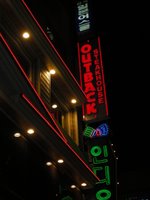
 Of course, American expatriates get special dispensation from these otherwise stringent requirements. For example, if you are an American in Seoul, finding a turkey on Thanksgiving Day may be difficult. The upscale hoteliers offered both take-out and dine-in Thanksgiving meals. The take-out price for the smallest turkey and sides was approximately $162 (serves 4). Given the cost-prohibitive nature of keeping a traditional Thanksgiving, dinner at an American franchise was a servicable alternative. The spirit of the Thanksgiving season is not totally unknown here in Seoul. For example, they put up their Christmas/New Years decorations way too god-damned early - just like home. I mean, sure, Advent already started, but c'mon...
Of course, American expatriates get special dispensation from these otherwise stringent requirements. For example, if you are an American in Seoul, finding a turkey on Thanksgiving Day may be difficult. The upscale hoteliers offered both take-out and dine-in Thanksgiving meals. The take-out price for the smallest turkey and sides was approximately $162 (serves 4). Given the cost-prohibitive nature of keeping a traditional Thanksgiving, dinner at an American franchise was a servicable alternative. The spirit of the Thanksgiving season is not totally unknown here in Seoul. For example, they put up their Christmas/New Years decorations way too god-damned early - just like home. I mean, sure, Advent already started, but c'mon...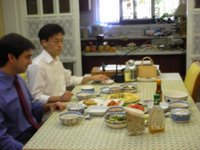
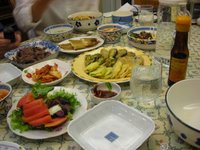

 Also, Koreans do celebrate a Thanksgiving-like holiday which shares many attributes with America's holiday. Chusok is Korea's harvest holiday. Celebrating the promise of a bountiful harvest, Koreans travel home to gather with extended family and feast. Some families take the opportunity to perform ancient Confucian ceremonies honoring the deceased.As the holiday celebration coincides with the harvest moon (15th day of the 8th lunar month or Oct. 6, 2006),Koreans may offer prayers to the moon wishing good-health, happiness and prosperity to friends and family. This year, seoulitaryconfinement was honored by Korean friends with an invitation to a traditional Chusok breakfast. This experience well makes up for any subsequent Thanksgiving celebration malfunctions. Of course, even in Korea, the Thanksgiving celebration is incomplete without the "Itis".Thanks Hans!!!
Also, Koreans do celebrate a Thanksgiving-like holiday which shares many attributes with America's holiday. Chusok is Korea's harvest holiday. Celebrating the promise of a bountiful harvest, Koreans travel home to gather with extended family and feast. Some families take the opportunity to perform ancient Confucian ceremonies honoring the deceased.As the holiday celebration coincides with the harvest moon (15th day of the 8th lunar month or Oct. 6, 2006),Koreans may offer prayers to the moon wishing good-health, happiness and prosperity to friends and family. This year, seoulitaryconfinement was honored by Korean friends with an invitation to a traditional Chusok breakfast. This experience well makes up for any subsequent Thanksgiving celebration malfunctions. Of course, even in Korea, the Thanksgiving celebration is incomplete without the "Itis".Thanks Hans!!!


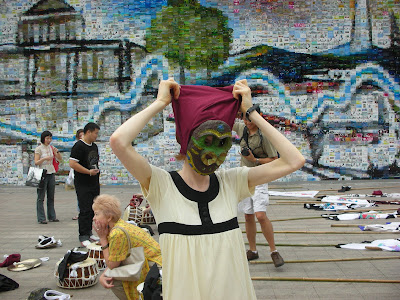
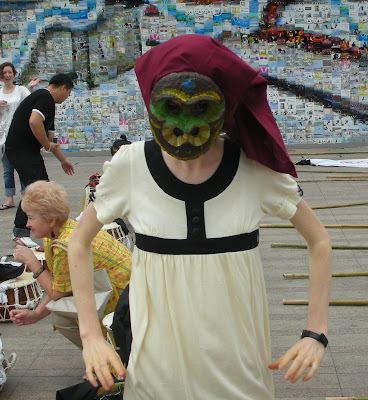

.JPG)


